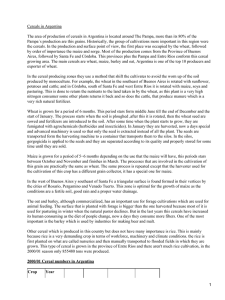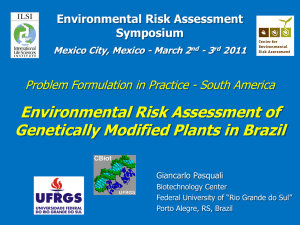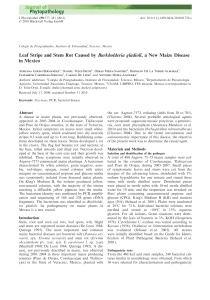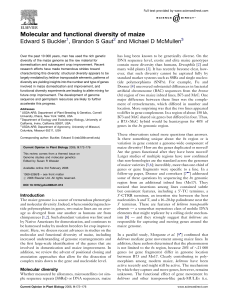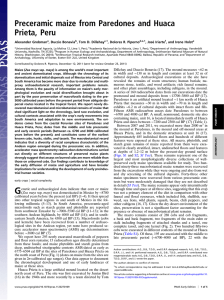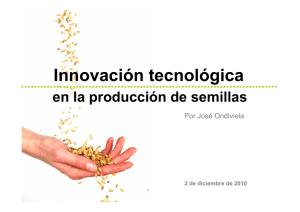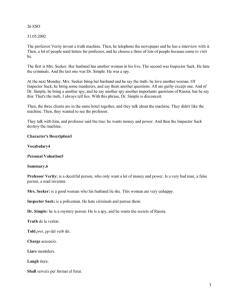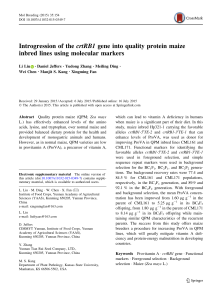La Comisión autoriza la importación de maíz
Anuncio
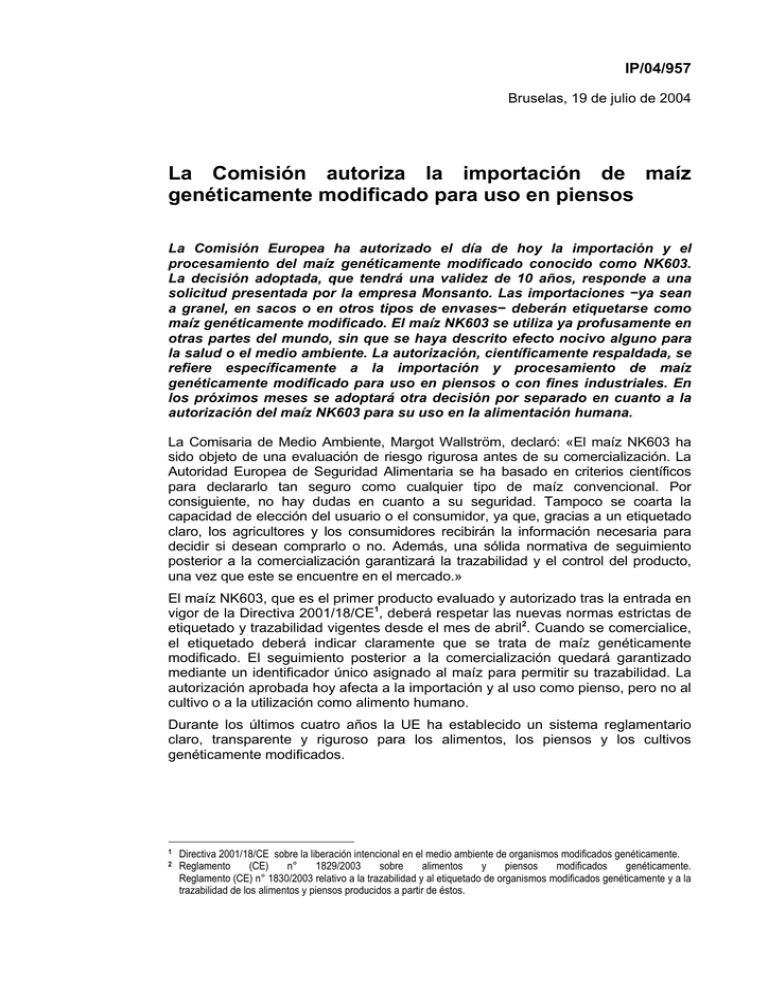
IP/04/957 Bruselas, 19 de julio de 2004 La Comisión autoriza la importación de maíz genéticamente modificado para uso en piensos La Comisión Europea ha autorizado el día de hoy la importación y el procesamiento del maíz genéticamente modificado conocido como NK603. La decisión adoptada, que tendrá una validez de 10 años, responde a una solicitud presentada por la empresa Monsanto. Las importaciones −ya sean a granel, en sacos o en otros tipos de envases− deberán etiquetarse como maíz genéticamente modificado. El maíz NK603 se utiliza ya profusamente en otras partes del mundo, sin que se haya descrito efecto nocivo alguno para la salud o el medio ambiente. La autorización, científicamente respaldada, se refiere específicamente a la importación y procesamiento de maíz genéticamente modificado para uso en piensos o con fines industriales. En los próximos meses se adoptará otra decisión por separado en cuanto a la autorización del maíz NK603 para su uso en la alimentación humana. La Comisaria de Medio Ambiente, Margot Wallström, declaró: «El maíz NK603 ha sido objeto de una evaluación de riesgo rigurosa antes de su comercialización. La Autoridad Europea de Seguridad Alimentaria se ha basado en criterios científicos para declararlo tan seguro como cualquier tipo de maíz convencional. Por consiguiente, no hay dudas en cuanto a su seguridad. Tampoco se coarta la capacidad de elección del usuario o el consumidor, ya que, gracias a un etiquetado claro, los agricultores y los consumidores recibirán la información necesaria para decidir si desean comprarlo o no. Además, una sólida normativa de seguimiento posterior a la comercialización garantizará la trazabilidad y el control del producto, una vez que este se encuentre en el mercado.» El maíz NK603, que es el primer producto evaluado y autorizado tras la entrada en vigor de la Directiva 2001/18/CE1, deberá respetar las nuevas normas estrictas de etiquetado y trazabilidad vigentes desde el mes de abril2. Cuando se comercialice, el etiquetado deberá indicar claramente que se trata de maíz genéticamente modificado. El seguimiento posterior a la comercialización quedará garantizado mediante un identificador único asignado al maíz para permitir su trazabilidad. La autorización aprobada hoy afecta a la importación y al uso como pienso, pero no al cultivo o a la utilización como alimento humano. Durante los últimos cuatro años la UE ha establecido un sistema reglamentario claro, transparente y riguroso para los alimentos, los piensos y los cultivos genéticamente modificados. 1 2 Directiva 2001/18/CE sobre la liberación intencional en el medio ambiente de organismos modificados genéticamente. Reglamento (CE) n° 1829/2003 sobre alimentos y piensos modificados genéticamente. Reglamento (CE) n° 1830/2003 relativo a la trazabilidad y al etiquetado de organismos modificados genéticamente y a la trazabilidad de los alimentos y piensos producidos a partir de éstos. El procedimiento de autorización en virtud del nuevo sistema garantiza que sólo podrán comercializarse en el mercado europeo los organismos modificados genéticamente que resulten seguros por lo que respecta tanto al consumo humano y animal, como a la liberación en el medio ambiente. La concesión de las autorizaciones está condicionada a la evaluación, caso por caso, de los organismos de que se trate. Las solicitudes de autorización que no cumplen todos los criterios han sido desestimadas hasta la fecha y lo seguirán siendo. Por la decisión de hoy se autoriza la utilización del maíz NK603 en los piensos. Sin embargo, las importaciones destinadas a ese uso sólo podrán comenzar una vez que se haya concedido una autorización equivalente para la alimentación humana. El Consejo de Agricultura estudia en la actualidad una decisión al respecto con arreglo al Reglamento sobre nuevos alimentos y se espera que adopte una decisión en los próximos meses. Se anexa la lista de los organismos modificados genéticamente ya aprobados o pendientes de autorización. Para más información, véase el documento MEMO/04/102 (Preguntas y respuestas sobre la reglamentación relativa a los OMG en la UE). 2 Note to the Editors: In January 2001, Monsanto submitted a request, under Directive 2001/18/EC, to the competent authorities of Spain for placing genetically modified maize line NK603 on the market for import and processing for use in feed and for industrial purposes. The NK603 maize is tolerant to the herbicide glyphosate. The product involves a simple modification and does not contain an antibiotic resistance marker gene. The Spanish competent authority came to the conclusion that NK603 maize is as safe as conventional maize. The European Food Safety Authority also appraised the application and focused on the limited number of scientific issues raised by competent authorities from the other Member States. Its opinion similarly concluded that NK603 maize was as safe as conventional maize. The Regulatory Committee established under Directive 2001/18/EC did not give an opinion. The Commission therefore submitted a proposal to the Council on 29 March 2004. The Council was required to act within 3 months. The proposal was considered by the Environment Council on 28 June 2004. At that meeting, which included Ministers from the new Member States, neither a qualified majority vote in favour or against approval was obtained. This deemed that the Council did not act within the requisite time limit and consequently, the Commission under the legal procedure is obliged to adopt the Decision. The methodology used for the safety assessment of the NK603 maize was entirely that of the new regulatory framework, notably Directive 2001/18/EC. The Directive also provides for mandatory measures to be applied to the product following approval. This includes post-market monitoring of the continued safety of the product once it has been placed on the market via use of surveillance systems. This monitoring is required throughout the period of validity of the consent. The consent holder is required to submit reports of this monitoring programme to all Member States and the Commission on an annual basis. The product will also have to be identifiable every time that it is placed on the market allowing individuals to choose whether or not to purchase and use the product. This will be ensured via the labelling and traceability provisions of the Directive and those of Regulation 1830/2003. Under this Regulation, business operators must transmit and retain information about products that contain or are produced from GMOs at each stage of the placing on the market. Traceability provides the means to trace products containing or produced from GMOs through the production and distribution chains. The Regulation also provides for comprehensive information by its requirement for labelling of GMOs at all stages of the placing on the market. The label has to indicate "This product contains genetically modified organisms" or "This product contains genetically modified maize". A validated detection method and appropriate reference material is available and will allow for the physical detection of the NK603 maize in products enabling labelling claims to be verified. Guidance as to sampling and testing to verify the presence of GMOs in products has also been agreed to by Member States and this will enable their inspection and control authorities to operate in a harmonised manner throughout the EU. 3 ANNEX 1 GMO products Approved under directive 90/220/EEC as of March 2001 Product Notifier Date of Commission Decision3 / Member State Consent4 1. Vaccine against Aujeszky's disease Vemie Veterinär Chemie GmbH 18.12.92 2. Vaccine against rabies Rhône-Mêrieux C/B/92/B28 & C/F/93/03-02 19.10.93 3. Tobacco tolerant to bromoxynil SEITA C/F/93/08-02 08.06.94 4. Vaccine against Aujeszky's disease (further uses)5 Vemie Veterinär Chemie GmbH C/D/92/I-1 18.07.94 5. Male sterile swede rape resistant to glufosinate ammonium (MS1, RF1) Uses : breeding activities Plant Genetic Systems C/UK/94/M1/1 06.02.96 6. Soybeans tolerant to glyphosate Uses : import and processing Monsanto C/UK/94/M3/1 03.04.96 7. Male sterile chicory tolerant to glufosinate ammonium Uses : breeding activities Bejo-Zaden BV C/NL/94/25 20.05.96 8. Bt-maize tolerant to glufosinate ammonium (Bt-176) Ciba-Geigy C/F/94/11-03 23.01.97 9. Male sterile swede rape tolerant to glufosinate ammonium (MS1, RF1)6 Uses : import and Processing Plant Genetic Systems C/F/95/05/01/A 3 4 5 6 where objections were raised by Member State authorities in the absence of objections by Member State authorities linked to item 1 (same product, further uses) linked to item 5 (same product, further uses) 4 06.06.97 (not finally approved by F) Product Notifier Date of Commission Decision7 / Member State Consent8 10. Male sterile swede rape tolerant to glufosinate ammonium (MS1, RF2)9 Plant Genetic Systems C/F/95/05/01/B 11. Test kit to detect antibiotic residues in milk Valio Oy C/F1/96-1NA 12. Carnation lines with modified flower colour Florigene C/NL/96/14 13. Swede rape tolerant to glufosinate ammonium (Topas 19/2) Uses : import and processing AgrEvo C/UK/95/M5/1 22.04.98 14. Maize tolerant to glufosinate ammonium (T25) AgrEvo C/F/95/12/07 22.04.98 15. Maize expressing the cryIA(b) gene (MON 810) Monsanto C/F/95/12-02 22.04.98 16. Maize tolerant to glufosinate ammonium and expressing the Bt cryIA(b) gene (Bt-11) Uses : import and processing Novartis (formerly Northrup King) C/UK/96/M4/1 22.04.98 17. Carnation lines with improved vase life Florigene C/NL/97/12 20.10.98 (MS consent) 18. Carnation lines with modified flower colour Florigene C/NL/97/13 20.10.98 (MS consent) 7 8 9 Bt 06.06.97 (not finally approved by F) 14.07.97 01.12.97 (MS consent) where objections were raised by Member State authorities in the absence of objections by Member State authorities this product is the result of a different transformation event to that of No. 9 5 ANNEX 2 GMO products Notifications received by the Commission under directive 2001/18/EC Product notification details Company Stage 1. Monsanto Consideration of assessment report and notification by Member States (60 day period) Monsanto EFSA Opinion published. Draft Decision pending submission to Regulatory Committee. Monsanto Draft Proposal with Council AMYLOGENE HB Consideration of assessment report and notification by Member States (60 day period) Bayer CropScience Consideration of assessment report and notification by Member States (60 day period) Bayer CropScience Application to be transformed into an application under Regulation 1829/2003 on GM Food and Feed Monsanto/ Syngenta Withdrawn Maize hybrid MON810 x NK603 (glyphosate-tolerant and containing Bt toxin) Received by UK under Dir 90/220/EC. (C/GB/02/M3/03) Received by the Commission under Dir 2001/18 : 15/01/03 Uses: import and use in feed and industrial processing, not for cultivation. 2. Oil seed rape – herbicide resistant GT 73 Received by the Netherlands (C/NL/98/11) under Dir 90/220/EC. Received by the Commission under Dir 2001/18 : 16/1/03 Uses: import and uses in feed and industrial processing, not for cultivation. 3. Maize Roundup Ready NK603, tolerant to glyphosate herbicide Received by Spain (C/ES/00/01) under Dir 90/220 : 21/12/2000 Received by the Commission under Dir 2001/18 : 17/01/03 Uses: import and use in feed and industrial processing, not for cultivation. 4. Potato with altered starch composition from Sweden (C/SE/96/3501) Received by the Commission under Dir 90/220: 20.05.98 Favourable opinion of EU Scientific Committee 18.07.02 Received by the Commission under Dir 2001/18/EC: 24/01/03 Uses: for cultivation and production of starch, not for use as human food. 5. Oilseed rape (Ms8, Rf3) from Belgium (C/BE/96/01) Received by the Commission: under Dir 90/220 16.01.97 Favourable opinion of EU Scientific Committee 19.05.98 Received by the Commission under Dir 2001/18: 5/02/03 Uses: import and cultivation in the EU, uses in feed and industrial processing. 6. Soybeans Glufosinate tolerant (Events A 2704-12 & A 5547-127) from Belgium (C/BE/98/01) Received by the Commission under Dir 2001/18: 5/02/03 Uses: import only, not for cultivation 7. Roundup Ready sugar beet (event T9100152), glyphosate tolerant from Belgium C/BE/99/01 Received by the Commission under Dir 2001/18: 5/02/03 Uses: for cultivation and use in animal feed, processing of sugar and other products. 6 8. Oilseed rape tolerant for glufosinate-ammonium herbicides. (FALCON GS40/90pHoe6/Ac) from Germany (C/DE/96/5) Bayer CropScience Application to be transformed into an application under Regulation 1829/2003 on GM Food and Feed Bayer CropScience Application to be transformed into an application under Regulation 1829/2003 on GM Food and Feed KWS SAAT AG/Monsanto Application to be transformed into an application under Regulation 1829/2003 on GM Food and Feed Monsanto EFSA Opinion published. Draft Decision pending submission to Regulatory Committee. Bayer CropScience Application to be transformed into an application under Regulation 1829/2003 on GM Food and Feed Pioneer/ Mycogen Seeds Submitted to EFSA for Opinion Monsanto Application to be transformed into an application under Regulation 1829/2003 on GM Food and Feed Monsanto Application to be transformed into an application under Regulation 1829/2003 on GM Food and Feed Received by the Commission under Dir 90/220: 25.11.96 Opinion of EU Scientific Committee 27.07.98 Received by the Commission under Dir 2001/18: 7/02/03 Uses: for import and cultivation 9. Oilseed rape tolerant for glufosinate (Liberator pHoe6/Ac) from Germany (C/DE/98/6) Received by the Commission under Dir 90/220: 29.10.98 Favourable opinion of EU Scientific Committee 30.11.00 Received by the Commission under Dir 2001/18: 7/02/03 Uses: for import and cultivation 10. Roundup Ready Sugar Beet event H7-1 (tolerant to glyphosate) from Germany C/DE/00/8 Received by the Commission under Dir 2001/18: 7/02/03 Uses: for cultivation and use in processing of sugar and other processed products. 11. Maize MON 863 X MON 810 (protection against certain insect pests) from Germany C/DE/02/9 (6788-01-09) Received by the Commission under Dir 2001/18: 7/02/03 Uses:, for import and use of grain and grain products, not for cultivation. 12. Oilseed rape (event T45) tolerant for glufosinate-ammonium herbicide from UK C/GB/04/M5/4 (Replacing C/GB/99/M5/2 received by the Commission on 10/2/03 and withdrawn on 26/3/04). Received by the Commission under Dir 2001/18: 30/03/04 Uses: import and use in feed and industrial processing, not for cultivation. 13. Maize herbicide and insect resistant (line 1507 -- CRY1F) Received by the Netherlands (C/NL/00/10) under Dir 90/220/EC. Received by the Commission under Dir 2001/18 : 12/02/03 Uses: import and processing, not for cultivation 14. Insect-protected Cotton expressing the Bt cryIA(c) gene (line 531) from Spain (C/ES/96/02) Received by the Commission under Dir 90/220: 24.11.97 Favourable opinion of EU Scientific Committee 14.07.98 Received by the Commission under Dir 2001/18: 12/2/03 Uses: for import, processing and cultivation 15. Roundup Ready Cotton tolerant to herbicide (line 1445) from Spain (C/ES/97/01) Received by the Commission under Dir 90/220: 24.11.97 Favourable opinion of EU Scientific Committee 14.07.98 Received by the Commission under Dir 2001/18: 12/2/03 Uses: for import, processing and cultivation 7 16. Maize 1507 (or Bt Cry1F 1507) Pioneer/ Mycogen Seeds Consideration of assessment report and notification by Member States (45 day period) DLF-Trifolium, Monsanto and Danisco Seed Application to be transformed into an application under Regulation 1829/2003 on GM Food and Feed Syngenta SAS Submitted to EFSA for Opinion Received by Spain (C/ES/01/01) 11/7/2001 under Dir 90/220/EC. Received by the Commission under Dir 2001/18: 13/2/03 Uses: Cultivation 17. Roundup Ready Fodder beet (line A5/15) from Denmark (C/DK/97/01) Received by the Commission under Dir 90/220: 09.10.97 Favourable opinion of EU Scientific Committee 23.06.98 Received by the Commission under Dir 2001/18/EC: 26/02/03 Uses: for cultivation and animal feed. 18. Maize tolerant to glufosinate ammonium and expressing the Bt cryIA(b) gene (Bt-11) from France (C/F/96/05-10) Seeds Received by the Commission under Dir 90/220: 12.04.99 and 03.05.99 respectively Favourable opinion of EU Scientific Committee 30.11.00 Received by the Commission under Dir 2001/18/EC: 16.6.2003 Uses : for cultivation, feed and industrial processing 19. Bromoxynil-tolerant cotton lines 10215 and 10222 from Spain (C/ES/99/01) Stoneville Pedigreed Company Seed Received by the Commission under Dir 2001/18/EC: 18.07.2003 Application to be transformed into an application under Regulation 1829/2003 on GM Food and Feed Uses : for importation and processing to non-viable products 20. NK603 Roundup Ready® maize from Spain (C/ES/03/01) Monsanto Application with lead competent authority (90 day period) Bayer CropScience Ltd. Consideration of assessment report and notification by Member States (60 day period) Monsanto Application with lead competent authority (90 day period) Agrigenetics Inc. d/b/a Mycogen Seeds, c/o Dow AgroSciences Application to be transformed into an application under Regulation 1829/2003 on GM Food and Feed Bayer CropScience Application to be transformed into an application under Regulation 1829/2003 on GM Food and Feed Received by the Commission under Dir 2001/18/EC : 22/07/2003 Uses: Cultivation 21. Rice tolerant to glufosinate-ammonium, event LLRICE62 from UK (C/GB/03/M5/3) Received by the Commission under Dir 2001/18/EC : 3/9/2003 Uses: import and use in feed and industrial processing, not for cultivation. 22. NK603 X MON 810 maize from Spain (C/ES/04/01) Received by the Commission under Dir 2001/18/EC : 12/1/2004 Uses: import and use in feed and industrial processing, and for cultivation. 23. Cotton, insect resistant (281-24-236/3006-210-23) from the Netherlands (C/NL/04/01) Received by the Commission under Dir 2001/18/EC : 18/2/2004 Uses: import and use in feed and industrial processing, not for cultivation nor feed use 24. Cotton (LLCotton25) glufosinate tolerant from Spain (C/ES/04/02) Received by the Commission under Dir 2001/18/EC : 26/3/2004 Uses: import and use in feed and industrial processing, not for cultivation 8 ANNEX 3 Genetically Modified (GM) foods authorised in the European Union EVENT CROP APPLICANT TRAIT POTENTIAL FOOD USES DATE Insect protection and herbicide tolerance Insect protection and herbicide tolerance Herbicide tolerance Herbicide tolerance Soy foods. Soy foods include soy beverages, tofu, soy oil, soy flour, lecithin. 03.04.1996 Dir. 90/220/EEC – Art. 13 Maize foods. Maize foods include kernels, oil, maize flour, sugar, syrup. 23.01.1997 Dir. 90/220/EEC – Art. 13 24.06.1997 24.06.1997 Reg. (EC) 258/97 – Art. 5 Reg. (EC) 258/97 – Art. 5 24.06.1997 Reg. (EC) 258/97 – Art. 5 21.11.1997 06.02.1998 06.02.1998 Reg. (EC) 258/97 – Art. 5 Reg. (EC) 258/97 – Art. 5 Reg. (EC) 258/97 – Art. 5 06.02.1998 Reg. (EC) 258/97 – Art. 5 23.10.1998 08.11.1999 Reg. (EC) 258/97 – Art. 5 Reg. (EC) 258/97 – Art. 5 08.11.1999 Reg. (EC) 258/97 – Art. 5 26.04.2000 Reg. (EC) 258/97 – Art. 5 19.12.2002 Reg. (EC) 258/97 – Art. 5 19.12.2002 23.03.2000 Reg. (EC) 258/97 – Art. 5 Reg. (EC) 258/97 – Art. 5 1 GTS 40/3/2 Soybean Monsanto 2 Bt 176 Maize Ciba-Geigy 3 4 TOPAS 19/2 MS1 / RF2 Oilseed rape Oilseed rape 5 MS1 / RF1 Oilseed rape AgrEvo Plant Genetic Systems Plant Genetic Systems 6 7 8 GT 73 MON 810 T 25 Oilseed rape Maize Maize Monsanto Monsanto AgrEvo Herbicide tolerance Insect protection Herbicide tolerance 9 Bt 11 Maize Novartis Insect protection 10 11 MON 809 Falcon GS 40/90 Liberator L62 Maize Oilseed rape Pioneer Hoechst / AgrEvo Insect protection Herbicide tolerance Oilseed rape Hoechst / AgrEvo Herbicide tolerance 13 MS8/RF3 Oilseed rape Herbicide tolerance 14 1445 Cotton Plant Genetic Systems Monsanto 15 16 531 pRF69/pRF9 3 Cotton Bacillus subtilis Monsanto F. Hoffmann - La Roche 12 Herbicide tolerance Herbicide tolerance Insect protection Riboflavin Rapeseed oil. Products made with rapeseed oil may include fried foods, baked products and snack foods. Maize derivatives. These may include maize oil, maize flour, sugar and syrup. Products made with maize derivatives may include snack foods, baked foods, fried foods, confectionary and soft drinks. Rapeseed oil. Products made with rapeseed oil may include fried foods, baked foods and snack foods. Cottonseed oil. Products made with cottonseed oil may include fried foods, baked foods and snack foods. Vitamin B2 9 LEGAL BASIS ANNEX 4 Genetically Modified (GM) foods pending authorisation in the European Union 1 EVENT CROP APPLICANT TRAIT FOOD USES Bt 11 Maize Syngenta Insect resistance Processed sweet maize. INITIAL ASSESSMENT SCIENTIFIC OPINION NL – 27/04/2000 SCF – 13.03.2002 LEGAL BASIS / Stage of procedure Reg. (EC) No. 258/97 – Art. 7 Back to Commission on 4 May 2004, since no qualified majority was reached in Council 2 GA 21 Maize Monsanto Herbicide tolerance Maize and maize derivatives NL – 21/12/1999 SCF – 02.02.1999 Reg. (EC) No. 258/97 – Art. 7 Awaiting validation of detection method 3 NK 603 Maize Monsanto Herbicide tolerance Maize and maize derivatives NL – 13/08/2002 EFSA – 04.12.2003 Reg. (EC) No. 258/97 – Art. 7 Opinion by Member States on Commission proposal scheduled for the meeting of the Standing Committee on the Food Chain and Animal Health on 30 April 2004 4 MON 863 Maize Monsanto Insect protection Maize and maize derivatives DE – 08/04/2003 EFSA – Opinion adopted on 2April 2004 Reg. (EC) No. 258/97 – Art. 7 Awaiting validation of detection method 5 MON 863 x MON 810 Maize Monsanto Insect protection Maize and maize derivatives DE – 08/04/2003 EFSA - pending Reg. (EC) No. 1829/2003 Art. 46.1 6 1507 Maize Pioneer Insect protection Maize and maize derivatives NL – 04/11/2003 EFSA - pending Reg. (EC) 258/97 – Art. 7 7 MaisGard/R oundupRead y Maize Monsanto Insect protection and herbicide tolerance Maize and maize derivatives NL – pending Reg. (EC) No. 1829/2003 Art. 46.1 8 RoundupRe ady Sugar Beet Sugar Beet Monsanto NL – pending Application withdrawn on 16 April 2004 9 Liberty Link Soybean Soybean AgrEvo B – pending Reg. (EC) No. 1829/2003 Art. 46.1 Herbicide tolerance Herbicide tolerance Sugar Beet derivatives Soybean derivatives
